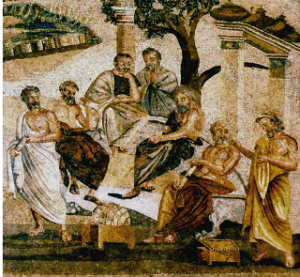
Modern sophistry and practical wisdom
Sophists accredit education and are not born, but because it is a relative age  and a code of ethics that prevents or satisfies human instincts and passions, even though Socrates worked out happiness as a combination of virtues (in Greek it means time of moral and political excellence, today in opposite fields), and its method is irony and pharmaceutical.
and a code of ethics that prevents or satisfies human instincts and passions, even though Socrates worked out happiness as a combination of virtues (in Greek it means time of moral and political excellence, today in opposite fields), and its method is irony and pharmaceutical.
We explicitly explain in the post that irony is not about proximity or skepticism, that there are exceptions to Greek origin, but that the Greek word has a definite meaning, but with successive verbs in a discussion that Socrates left against each other . part of his method is mayo-art, which is the art of parity, which is not the end or the social method, because irony takes or the opponent realizes that his preconcepters have the capacity to reflect and only conceive ideas that lead the truth.
We retaliate so much that the sophists assume that, as far as they are concerned, they do not formulate formulas, but that they satisfy their instincts in a way that satisfies the idea of virtuous politics and ethics or at a moderate pace by Socrates when the illusion is natural. because of its instinctive benefits.
Plato, as a disciple of Socrates, does not believe that Socrates himself is in Plato and refuses the Protagoras’ sophistry, or the dialogue that takes place in the virtuous vise, whether incisive or not, and this is the fundamental point for Plato’s birth. , second historians, approximately 384-383 BC, located in the gardens in the suburbs of Athens (pictured in the mosaic of Pompeii, now in the Archaeological Museum of Naples).
It is mandatory to educate or homosexuals for the sake of seriousness and assimilation to the decadence of Greek democracy brought about by the sophist school, so that you can have a relative opinion and verdict, but it is based on whether you are sensible or intelligent, dialectical or basic here, where it will be essential and overcoming doxa, an opinion and a construct of epistemia, knowledge organized in universal universes.
The evolution of dialogues, especially in Plato’s Republic, shows the dialectical evolution (it is not and could not be Hegelian for historical reasons) of the terms of the episteme until it constitutes an ethical structure that leads to the formulation of laws, but ethics as we know it today it comes from the school of one of Plato’s students, Aristotle, who elaborated “Ethics to Nicomachus”, a teleological and eudaimonist conception (Eudaimonia was happiness for the ancient Greeks), around a practical rationality, what the Greeks called phronesis, one of the elements of ethics, that it is logos plus ethos.
Aristotle created then wisdom as a virtue of practical thought, or just practical wisdom, the objective is to describe the phenomena of human action through the dialectical examination of opinions, the residue of the Socratic method, but to discover in them immutable principles, thus it is possible to overcome the doxa and reach episteme knowledge, one can describe this dialectic as knowing-understanding-knowing.
Later Aristotle. one of the students of his Platonic school, is going to do his Lyceum, which was essentially made by walking, therefore also called peripatetics, but the school has a gynasium for physical exercises, and also for socializing the acquired knowledge.
Gadamer’s philosophical hermeneutics will rework the Phrase by systematizing Heidegger’s hermeneutic circle, creating a hermeneutic philosophy.









